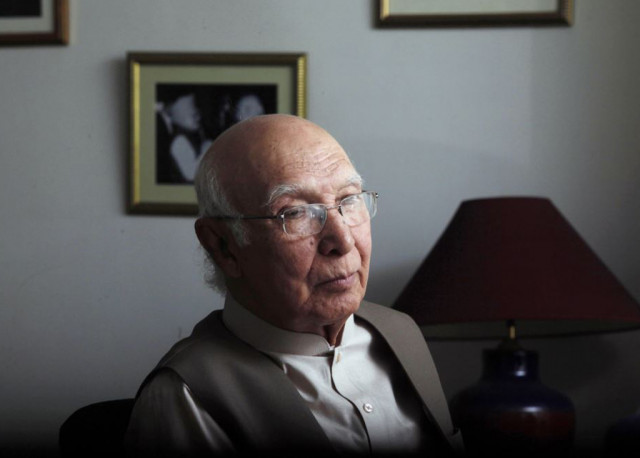India-Pakistan talks sink into jeopardy
FO statement suggests Sartaj Aziz is unlikely to travel to New Delhi; PM’s adviser set to brief media today

PM Adviser on National Security and Foreign Affairs Sartaj Aziz. PHOTO: REUTERS
The much-hyped meeting between the national security advisers (NSA) of Pakistan and India seems to be all but called off after both sides refused to budge from their stances on the agenda of the talks and Islamabad’s invitation to Hurriyat leaders for a meeting with Sartaj Aziz.
Although there was no clear official announcement regarding the cancellation of the talks from either side, a late night statement issued by Pakistan’s Foreign Office (FO) on Friday suggested the meeting is unlikely to take place.
“We are deeply disappointed at the statement of the spokesperson of India’s Ministry of External Affairs, putting forth pre-conditions for official talks to take place with Pakistan at the level of the national security advisers,” said the statement.

The bone of contention was Pakistan’s invitation to Kashmiri Hurriyat leaders at a reception hosted in honour of Prime Minister’s Adviser on National Security and Foreign Affairs Sartaj Aziz during his stay in New Delhi.
Read: India-Pakistan talks — need for maturity
On Friday morning, the spokesman of India’s external affairs ministry announced on Twitter that New Delhi had advised Islamabad against meeting the Kashmiri leaders before or after the NSA talks.
“Such a meeting would not be in keeping with the spirit and intent of the Ufa understanding to jointly work to combat terrorism,” Vikas Swarup posted on the micro-blogging website.
Hours later, in reply to the Indian advisory, Pakistan dismissed the suggestion and made it clear that Aziz would indeed meet Hurriyat leaders “in keeping with the ‘practice and tradition of past many years.”
“Pakistan sees no reason to depart from this established practice,” Pakistan conveyed to the Indian government, prompting New Delhi to announce that it could not go ahead with the process. India also accused Pakistan of backtracking from the proposed agenda of NSA talks by including Kashmir and other issues.

“Unilateral imposition of new conditions and distortion of the agreed agenda cannot be the basis for going forward,” Swarup said in a sharply-worded statement.
However, the Indian external affairs ministry would not categorically say whether the meeting of NSA was cancelled. It is believed that both sides wanted the other to make the announcement of cancellation of talks in order to avoid the blame. There had been conflicting reports as the state-run Press Trust of India (PTI) first reported that talks had been called off but later retracted the story.
Both the Indian external affairs ministry spokesman and home minister insisted that New Delhi was committed to discussing issues with Pakistan peacefully and bilaterally.
“We [just] stand firm that whatever talks are held with Pakistan should focus only on terrorism,” India’s Home Minister Rajnath Singh said.
The wording of the Pakistani FO statement, nevertheless, indicated that Aziz was unlikely to travel to New Delhi as scheduled.
“This is the second time that India has chosen to go back on a decision mutually agreed upon between the two prime ministers, to engage in comprehensive dialogue, by coming up with frivolous pretexts,” FO spokesperson Qazi Khalilullah said.
He said tension between the two countries had increased alarmingly as a result of frequent violations on the Line of Control (LoC) and working boundary over the past few months. “The need of the hour was for the two countries to engage in sincere and serious dialogue to immediately reduce tensions and to undertake the task of normalisation of relations, with sincerity and seriousness.”
The spokesman argued that the Kashmiri Hurriyat leaders are genuine stakeholders in efforts to find a lasting solution of the Kashmir dispute. “For India to refuse to engage in talks with Pakistan on this pretext is a repeat of what it did when it cancelled the foreign secretary-level talks that were scheduled to be held on August 25 last year, pursuant to the meeting between the two prime ministers in New Delhi in May 2014,” he recalled.
Read: Pakistan snubs India's 'advice' against meeting Hurriyat
He said for the NSA talks in Delhi, Pakistan had proposed a comprehensive agenda, consistent with the decisions taken by the two Prime Ministers in Ufa, which included discussion on all outstanding issues, including Kashmir, as well as terrorism related matters, and other issues such as religious tourism, release of fishermen and peace and tranquility on the LoC. However, regrettably, the Indian side’s desire to restrict the agenda to terrorism related issues only, amounts to a negation of the decisions taken by the two prime ministers, he maintained.
“It is not Pakistan that has placed any condition for the talks. In fact, Pakistan has always demonstrated its belief in the dialogue process and is prepared to engage in meaningful talks with India, to resolve all outstanding issues that have bedeviled relations between the two countries, for the past many decades,” the spokesman emphasised.
He added that Pakistan does not disregard agreements or understandings. “It is the Indian side which has reneged on commitments agreed upon between the two heads of government in the past year,” he insisted.
He further said Pakistan wished to reiterate its abiding commitment to promoting a relationship of cordiality and cooperation with all its neighbours, including India, in pursuance of the Prime Minister’s vision of a peaceful neighbourhood.
Sartaj Aziz will address a news conference today (Saturday) to brief the media about the reason behind the cancellation of talks.
Published in The Express Tribune, August 22nd, 2015.



















COMMENTS
Comments are moderated and generally will be posted if they are on-topic and not abusive.
For more information, please see our Comments FAQ